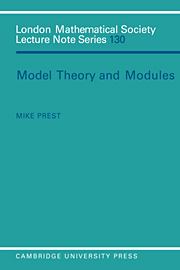Book contents
- Frontmatter
- Contents
- Introduction
- Acknowledgements
- Notations and conventions
- Remarks on the development of the area
- Section summaries
- Chapter 1 Some preliminaries
- Chapter 2 Positive primitive formulas and the sets they define
- Chapter 3 Stability and totally transcendental modules
- Chapter 4 Hulls
- Chapter 5 Forking and ranks
- Chapter 6 Stability-theoretic properties of types
- Chapter 7 Superstable modules
- Chapter 8 The lattice of pp-types and free realisations of pp-types
- Chapter 9 Types and the structure of pure-injective modules
- Chapter 10 Dimension and decomposition
- Chapter 11 Modules over artinian rings
- Chapter 12 Functor categories
- Chapter 13 Modules over Artin algebras
- Chapter 14 Projective and flat modules
- Chapter 15 Torsion and torsionfree classes
- Chapter 16 Elimination of quantifiers
- Chapter 17 Decidability and undecidability
- Problems page
- Bibliography
- Examples index
- Notation index
- Index
Chapter 7 - Superstable modules
Published online by Cambridge University Press: 15 December 2009
- Frontmatter
- Contents
- Introduction
- Acknowledgements
- Notations and conventions
- Remarks on the development of the area
- Section summaries
- Chapter 1 Some preliminaries
- Chapter 2 Positive primitive formulas and the sets they define
- Chapter 3 Stability and totally transcendental modules
- Chapter 4 Hulls
- Chapter 5 Forking and ranks
- Chapter 6 Stability-theoretic properties of types
- Chapter 7 Superstable modules
- Chapter 8 The lattice of pp-types and free realisations of pp-types
- Chapter 9 Types and the structure of pure-injective modules
- Chapter 10 Dimension and decomposition
- Chapter 11 Modules over artinian rings
- Chapter 12 Functor categories
- Chapter 13 Modules over Artin algebras
- Chapter 14 Projective and flat modules
- Chapter 15 Torsion and torsionfree classes
- Chapter 16 Elimination of quantifiers
- Chapter 17 Decidability and undecidability
- Problems page
- Bibliography
- Examples index
- Notation index
- Index
Summary
In Chapter 4 we obtained a fairly complete classification for the models of a totally transcendental theory of modules. We cannot expect to have as complete results for superstable modules, but we can at least hope to say a lot about them. For instance, we can classify the pureinjective models although, of course, that is something we are able to do in circumstances way beyond the superstable case. Indeed, it is quite noticable that the gap between the superstable and arbitrary cases appears to be much narrower in modules than in general stable structures.
The difficulties in superstable modules lie, not in the (t.t.) unlimited part, but inside the prime-pure-injective model. For example, Vaught's Conjecture is open for superstable modules (whereas it followed immediately for t.t. modules from the classification in §4.6). Even for modules of U-rank 1, Vaught's Conjecture was confirmed only recently (1986) by Buechler, and his proof is far from trivial.
The first section is concerned with the uncountable spectrum: given an uncountable cardinal λ, how many models are there (up to isomorphism) of cardinality λ? Shelah showed that for stable theories there is a severely limited number of possible spectrum functions λ↦n(λ, T). Ziegler showed which possibilities can be realised in modules (one need look no further than abelian groups). A proof, which does not depend on his classification result (§10.4), is given here.
A module has U-rank 1 iff every infinite pp-definable subgroup is of finite index in the whole module.
- Type
- Chapter
- Information
- Model Theory and Modules , pp. 155 - 172Publisher: Cambridge University PressPrint publication year: 1988

